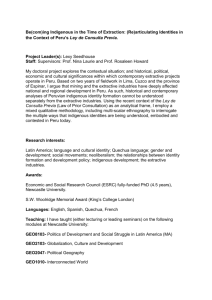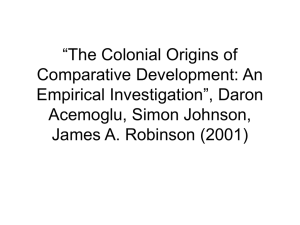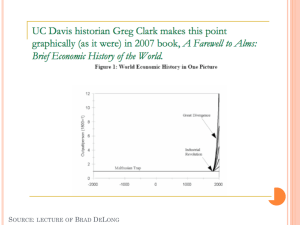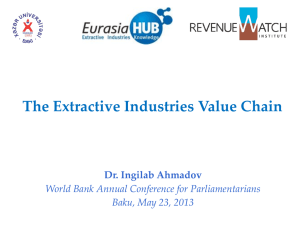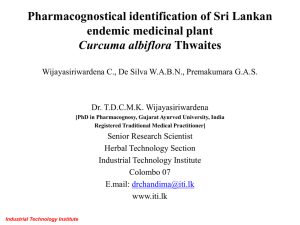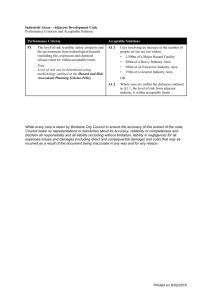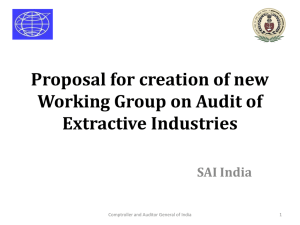10-3sr002 - Victorian Legislation and Parliamentary Documents
advertisement
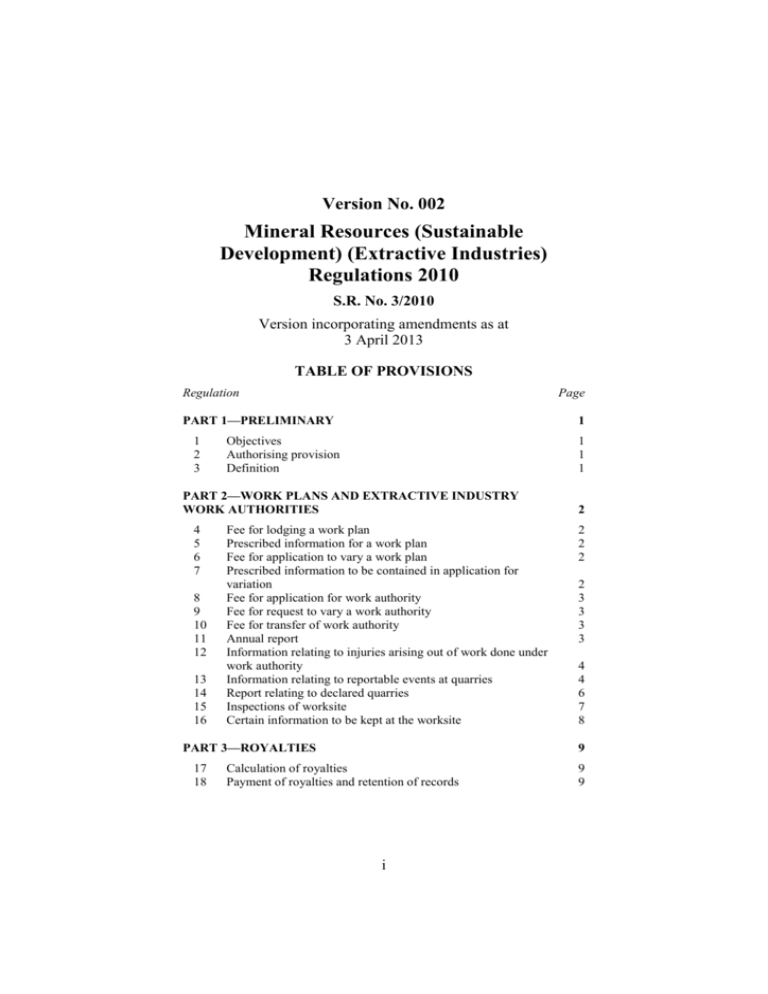
Version No. 002 Mineral Resources (Sustainable Development) (Extractive Industries) Regulations 2010 S.R. No. 3/2010 Version incorporating amendments as at 3 April 2013 TABLE OF PROVISIONS Regulation Page PART 1—PRELIMINARY 1 2 3 1 Objectives Authorising provision Definition 1 1 1 PART 2—WORK PLANS AND EXTRACTIVE INDUSTRY WORK AUTHORITIES 4 5 6 7 8 9 10 11 12 13 14 15 16 Fee for lodging a work plan Prescribed information for a work plan Fee for application to vary a work plan Prescribed information to be contained in application for variation Fee for application for work authority Fee for request to vary a work authority Fee for transfer of work authority Annual report Information relating to injuries arising out of work done under work authority Information relating to reportable events at quarries Report relating to declared quarries Inspections of worksite Certain information to be kept at the worksite PART 3—ROYALTIES 17 18 2 2 2 2 2 3 3 3 3 4 4 6 7 8 9 Calculation of royalties Payment of royalties and retention of records i 9 9 Regulation Page PART 4—EXTRACTIVE INDUSTRY INFRINGEMENTS 19 Infringement offences __________________ 11 11 SCHEDULES 12 SCHEDULE 1 12 PART 1—WORK PLAN INFORMATION 12 PART 2—DECLARED QUARRY STABILITY INFORMATION 14 SCHEDULE 2—Extractive Industry Work Authority—Annual Report 16 SCHEDULE 3—Rate of Royalties 21 1 2 Definitions Rates 21 21 SCHEDULE 4—Infringement Offences 22 ═══════════════ ENDNOTES 24 1. General Information 24 2. Table of Amendments 25 3. Explanatory Details 26 ii Version No. 002 Mineral Resources (Sustainable Development) (Extractive Industries) Regulations 2010 S.R. No. 3/2010 Version incorporating amendments as at 3 April 2013 PART 1—PRELIMINARY 1 Objectives The objectives of these Regulations are to prescribe— (a) various procedures relating to work plans and extractive industry work authorities; and (b) matters relating to royalties; and (c) fees, forms and other matters authorised by the Act; and (d) certain offences as infringement offences. 2 Authorising provision These Regulations are made under section 124 of the Mineral Resources (Sustainable Development) Act 1990. 3 Definition In these Regulations, the Act means the Mineral Resources (Sustainable Development) Act 1990. __________________ T-27/3/2013 1 Mineral Resources (Sustainable Development) (Extractive Industries) Regulations 2010 S.R. No. 3/2010 Part 2—Work Plans and Extractive Industry Work Authorities r. 4 PART 2—WORK PLANS AND EXTRACTIVE INDUSTRY WORK AUTHORITIES 4 Fee for lodging a work plan A person who lodges a work plan with the Department Head under section 77G(1) of the Act must pay a fee of 31 fee units. 5 Prescribed information for a work plan For the purposes of section 77G(3)(a) of the Act, the prescribed information is— (a) in the case of a declared quarry, the information set out in Part 1 and Part 2 of Schedule 1; (b) in any other case, the information set out in Part 1 of Schedule 1. 6 Fee for application to vary a work plan (1) Subject to subregulation (2), the holder of an extractive industry work authority who, under section 77H(3) of the Act, lodges an application for the approval of a variation of a work plan must pay a fee of 26 fee units. (2) Subregulation (1) does not apply to the holder of an extractive industry work authority who lodges an application to vary a work plan in accordance with a direction under section 77H(2) of the Act. 7 Prescribed information to be contained in application for variation For the purposes of section 77H(4) of the Act, the prescribed information is the information that relates to, and is applicable to, the proposed variation that is set out— (a) in the case of a declared quarry, in Part 1 and Part 2 of Schedule 1; (b) in any other case, in Part 1 of Schedule 1. T-27/3/2013 2 Mineral Resources (Sustainable Development) (Extractive Industries) Regulations 2010 S.R. No. 3/2010 Part 2—Work Plans and Extractive Industry Work Authorities r. 8 8 Fee for application for work authority A person who, under section 77I(1) of the Act, applies for an authority to carry out an extractive industry on land must pay a fee of— (a) if the land has an area of 5 hectares or more or a depth of more than 5 metres—41 fee units; (b) if the land has an area of less than 5 hectares and a depth not exceeding 5 metres—10 fee units. 9 Fee for request to vary a work authority A person who, under section 77M(2)(a) of the Act, requests a variation of an extractive industry work authority must pay a fee of 26 fee units. 10 Fee for transfer of work authority A person who, under section 77N of the Act, seeks the consent of the Minister to transfer an extractive industry work authority must pay a fee of 16 fee units. 11 Annual report For the purposes of section 116A(1) of the Act, in relation to work done under an extractive industry work authority within each financial year— (a) the prescribed form is the form in Schedule 2; and (b) the prescribed information is the information set out in the form in Schedule 2; and (c) the prescribed time is no later than 31 July next following the end of the financial year to which the information relates. T-27/3/2013 3 Mineral Resources (Sustainable Development) (Extractive Industries) Regulations 2010 S.R. No. 3/2010 Part 2—Work Plans and Extractive Industry Work Authorities r. 12 12 Information relating to injuries arising out of work done under work authority For the purposes of section 116A(1) of the Act, in relation to any injuries arising out of work done under an extractive industry work authority— (a) the prescribed form is in writing accompanied by a statutory declaration signed by the holder of the authority verifying that the contents of the summary are true and accurate; and (b) the prescribed information is a summary of statistics of any injuries arising out of work done under the authority within the following periods in each year— (i) the period beginning on 1 January and ending on 30 June; (ii) the period beginning on 1 July and ending on 31 December; and (c) the prescribed time is no later than 4 weeks after the end of the period to which the information relates. 13 Information relating to reportable events at quarries (1) For the purposes of section 116A(1) of the Act, in relation to any reportable event arising out of work done under an extractive industry work authority— (a) the prescribed form of furnishing the information is in writing containing the relevant prescribed information set out in paragraph (b); T-27/3/2013 4 Mineral Resources (Sustainable Development) (Extractive Industries) Regulations 2010 S.R. No. 3/2010 Part 2—Work Plans and Extractive Industry Work Authorities r. 13 (b) the prescribed information is— (i) a report of the reportable event notifying the Minister of the event, either orally or in writing, including— (A) the date, time and place of the event; (B) a description of the event; (C) the steps taken to minimise the impact of the event; and (ii) if the Minister so requests, a written report of the reportable event, providing further details to the Minister about the event, including— (A) the date, time and place of the event; (B) the details of the event, including the impact, or likely impact, of the event on public safety, the environment or infrastructure; (C) any known or suspected causes of the event; (D) details of the actions taken to minimise the impact of the event; (E) details of actions taken or proposed to be taken to prevent a recurrence of the event; (c) the prescribed time is as soon as practicable after the event has occurred. (2) In this regulation reportable event means— (a) an event, abnormal to expected, or usual, operations, that results, or may result, in significant impacts on public safety, the environment or infrastructure; T-27/3/2013 5 Mineral Resources (Sustainable Development) (Extractive Industries) Regulations 2010 S.R. No. 3/2010 Part 2—Work Plans and Extractive Industry Work Authorities r. 14 (b) an explosion or major outbreak of fire; (c) slope failure, unexpected creep, progressive slope collapse or failure of slope stability control measures; (d) an injury to a member of the public caused by the carrying out of the extractive industry or associated operations; (e) an uncontrolled outburst of gas; (f) an unexpected or abnormal inrush of groundwater, other water or other fluid; (g) an ejection of flyrock outside the worksite from blasting; (h) an escape, spillage or leakage of a harmful or potentially harmful— (i) substance; or (ii) slurry; or (iii) tailings; or (i) a breach of a condition of the extractive industry work authority; (j) an occurrence that results in non-compliance with the work plan or work plan conditions. 14 Report relating to declared quarries (1) The holder of an extractive industry work authority that relates to a declared quarry— (a) must prepare a report in writing in respect of each period of 6 months— (i) ending on 30 June or 31 December; or (ii) if the Minister nominates other dates in writing to the holder, ending on a date so nominated; and T-27/3/2013 6 Mineral Resources (Sustainable Development) (Extractive Industries) Regulations 2010 S.R. No. 3/2010 Part 2—Work Plans and Extractive Industry Work Authorities r. 15 (b) must provide the report to the Minister within 3 months after the end of the period to which it relates. (2) A report under subregulation (1) must include— (a) the outcomes of reviews of the assessment, plan and controls for the management of geotechnical and hydrogeological risks for the declared quarry, taking into account the results of monitoring carried out under the monitoring plan and details of— (i) the implementation of control measures; (ii) any stability modelling undertaken; (iii) any significant changes in the operation of the declared quarry; (iv) implications for the quarry design components; (b) the results of the monitoring plan set out in the work plan; (c) a description of activities taken to implement the declared quarry stability controls and the groundwater control system set out in Part 2 of Schedule 1 and any recommended changes to the work plan. 15 Inspections of worksite (1) Subject to subregulation (2), if an inspector inspects a worksite, the holder of an extractive industry work authority relating to land where the worksite is situated must pay a fee of— (a) if the land has an area of 5 hectares or more or a depth of more than 5 metres—24 fee units; T-27/3/2013 7 Mineral Resources (Sustainable Development) (Extractive Industries) Regulations 2010 S.R. No. 3/2010 Part 2—Work Plans and Extractive Industry Work Authorities r. 16 (b) if the land has an area of less than 5 hectares and a depth not exceeding 5 metres—11 fee units. (2) Subregulation (1) does not apply to a second or subsequent inspection of the same worksite during a financial year. 16 Certain information to be kept at the worksite The holder of an extractive industry work authority must ensure that— (a) a copy of the authority; and (b) any conditions that attach to the authority; and (c) the current approved work plan— are kept at the worksite or other place where an extractive industry activity to which the authority relates is being carried out for the use and information of the manager of the extractive industry activity. Penalty: 10 penalty units. __________________ T-27/3/2013 8 Mineral Resources (Sustainable Development) (Extractive Industries) Regulations 2010 S.R. No. 3/2010 Part 3—Royalties r. 17 PART 3—ROYALTIES 17 Calculation of royalties (1) Unless otherwise specified in an extractive industry work authority or waived or varied under section 12(4) of the Act, royalties are assessable with respect to stone extracted from Crown land at the applicable rate specified in Schedule 3— (a) upon that stone being sold or otherwise removed from the land in respect of which an extractive industry work authority is granted; or (b) if that stone is intended for use in the manufacture of concrete, asphalt, bricks, tiles or cement products on the same site where the stone is extracted, upon that stone being extracted. (2) For the purposes of the determination and payment of royalties in accordance with section 5AB of the Act in respect of the leased area within the meaning of the Mines (Aluminium Agreement) Act 1961, a reference in these Regulations to Crown land includes a reference to the leased area. 18 Payment of royalties and retention of records (1) Unless otherwise specified in an extractive industry work authority, royalties in respect of a financial year must be paid no later than 31 July next following the end of the financial year. (2) The holder of an extractive industry work authority must ensure that the payment under subregulation (1) is supported by a statutory declaration and accompanied by a return in the T-27/3/2013 9 Mineral Resources (Sustainable Development) (Extractive Industries) Regulations 2010 S.R. No. 3/2010 Part 3—Royalties r. 18 form set out in Part 3 of Schedule 2 showing the amount of stone on which royalties are payable in respect of the financial year. Penalty: 20 penalty units. (3) The holder of an extractive industry work authority must retain copies of records of sales and extractions for inspection purposes for 6 years. Penalty: 10 penalty units. __________________ T-27/3/2013 10 Mineral Resources (Sustainable Development) (Extractive Industries) Regulations 2010 S.R. No. 3/2010 Part 4—Extractive Industry Infringements r. 19 PART 4—EXTRACTIVE INDUSTRY INFRINGEMENTS 19 Infringement offences (1) For the purposes of Part 12 of the Act, an offence set out in column 2 of an item in Schedule 4 is prescribed as an infringement offence. (2) For the purposes of section 106(3) of the Act, the penalty prescribed for an offence set out in column 2 of an item in Schedule 4 is the penalty set out in column 4 of that item. __________________ T-27/3/2013 11 Mineral Resources (Sustainable Development) (Extractive Industries) Regulations 2010 S.R. No. 3/2010 Sch. 1 SCHEDULES SCHEDULE 1 Regulations 5, 7, 13 and 14 PART 1—WORK PLAN INFORMATION 1 A general description of the geological information of the location including estimates of stone resources. 2 A general location plan at a scale of 1:100 000 or 1:50 000. 3 A regional plan at a scale of 1:25 000 showing the extent of Crown lands, private lands, private land allotments, rivers and streams within the proposed work plan area and, where possible, parks and reserves within 2 kilometres of the site. Copies of certificates of title must also be submitted with respect to any private land allotments. 4 A site plan at an appropriate scale including crosssections, showing and describing existing surface contours and topographical features, drainage patterns, water courses, vegetation features and soil information and also including the following— (a) the surface facilities including the proposed location of buildings and the location of crushing, screening and other processing plant; (b) the anticipated extent of extraction with proposed bench heights, berm details and working batters; (c) the sequencing of extraction; (d) the location of topsoil and waste rock dumps and stockpile areas; (e) the location of proposed water dams, any slimes dams and sediment retention systems and any measures for the diversion of water from the site; (f) access roads. T-27/3/2013 12 Mineral Resources (Sustainable Development) (Extractive Industries) Regulations 2010 S.R. No. 3/2010 Sch. 1 5 Description of processing methods to be used including the proposed plant layout. 6 If the general location plan includes a declared quarry, the quarry stability requirements set out in Part 2. 7 An environmental management program setting out the following— (a) proposals for the disposal of any effluents, protection of groundwater and drainage and erosion control; (b) proposals for the suppression of noise, dust from any source and vibrations from blasting operations; (c) proposals for the effective monitoring of the operation. 8 A rehabilitation plan that complies with section 79 of the Act and sets out the following— (a) the concepts for the possible end use of the site; (b) the proposals for the progressive rehabilitation to a safe and stable landform of extraction areas including slope batters, road cuttings and dumps; (c) the proposals for landscaping to minimise the visual impact of the site; (d) any proposals to protect and conserve native vegetation during the production phase of the operation; (e) any proposals for the final rehabilitation and vegetation of the site including final security of the site, securing water dams and slimes dams and removal of plant and equipment. 9 A description of any significant community facilities that may be affected by the proposed works. T-27/3/2013 13 Mineral Resources (Sustainable Development) (Extractive Industries) Regulations 2010 S.R. No. 3/2010 Sch. 1 10 A community engagement plan that— (a) identifies any community likely to be affected by extractive industry activities authorised by the extractive industry work authority; and (b) includes proposals, in relation to extractive industry activities authorised by the extractive industry work authority, for— (i) identifying community attitudes and expectations; and (ii) providing information to the community; and (iii) receiving feedback from the community; and (iv) analysing community feedback and considering community concerns or expectations; and (c) includes a proposal for registering, documenting and responding to complaints and other communications from members of the community in relation to extractive industry activities authorised by the extractive industry work authority. PART 2—DECLARED QUARRY STABILITY INFORMATION 1 A description of the geological information that is relevant to the stability of the declared quarry and any variation of the geological information across the rest of the location plan, including a plan showing cross sections and long sections of the proposed extraction area of the declared quarry. 2 If a work plan was approved before the quarry became a declared quarry— (a) a description of any proposed changes to the information under item 4 of Part 1; (b) a description of any infrastructure or plant proposed to be associated with the declared quarry. T-27/3/2013 14 Mineral Resources (Sustainable Development) (Extractive Industries) Regulations 2010 S.R. No. 3/2010 Sch. 1 3 An assessment of the geotechnical and hydrogeological risks for the declared quarry. 4 A description of the controls that will be implemented to eliminate or reduce the geotechnical and hydrogeological risks to an acceptable level including— (a) a description of any proposed groundwater control system; and (b) particulars of other measures to ensure the stability of the quarry, associated infrastructure and adjacent land. 5 A plan for monitoring the stability and groundwater management of the declared quarry. 6 A description of the process for reviews of the assessment, plan, actions and controls referred to in this Part relating to the declared quarry. __________________ T-27/3/2013 15 Mineral Resources (Sustainable Development) (Extractive Industries) Regulations 2010 S.R. No. 3/2010 Sch. 2 SCHEDULE 2 Regulations 11 and 18 Mineral Resources (Sustainable Development) Act 1990 EXTRACTIVE INDUSTRY WORK AUTHORITY ANNUAL REPORT for the period 1 July 2 to 30 June 2 Extractive Industry Work Authority Number(s): Holder of Extractive Industry Work Authority: Location of Quarry: STATUTORY DECLARATION I, (full name) of (full address) sincerely declare— (a) that the information in Parts 1 and 2 of this Report is a true and correct statement of work done under the Extractive Industry Work Authority. (b) that the information in the Royalties Return in Part 3 of this Report is a true and correct statement of royalties payable with respect to stone sold or removed from Crown land or extracted from Crown land and used on site. (Delete if not applicable) I acknowledge that this declaration is true and correct and I make it in the belief that a person making a false declaration is liable to the penalties of perjury. Declared at in the State of Victoria on Before: (Name and address in legible writing, typing or stamp below signature.) A person authorised under section 107A(1) of the Evidence (Miscellaneous Provisions) Act 1958 to witness the signing of a statutory declaration. Person to be contacted if queries arise regarding this Report: Name: T-27/3/2013 Telephone Number: 16 Mineral Resources (Sustainable Development) (Extractive Industries) Regulations 2010 S.R. No. 3/2010 Sch. 2 PART 1—GENERAL Stone has been extracted or sold during the period 1 July 2 30 June 2 . to OR Stone has not been extracted or sold during the period 1 July 2 3 June 2 . to (Delete as appropriate) PART 2—DETAILS OF ROCK EXTRACTED Rock type Note 1 Product type Note 1 Total quantity (in cubic metres or tonnes) produced Note 2 Value of total sales at gate Note 3 Note 1: Rock type and Product type Choose rock type from the Table below and associated product types. Use the separate columns for each product type. Overburden from hard rock quarries should generally be shown as "fill" under the parent rock type, not as "clay and clay shale" unless used for manufacture of fired products. Note 2: Total quantity produced This is the useable quantity produced under the extractive industry work authority. (1) Include quarry products sold, used or disposed of during the period, being materials extracted from this site (including private and Crown land) and used by the holder of the extractive industry work authority or transferred to an associated operation. T-27/3/2013 17 Mineral Resources (Sustainable Development) (Extractive Industries) Regulations 2010 S.R. No. 3/2010 Sch. 2 (2) Do not include products produced from raw materials imported to this site from another operation. Such imported material, treated and sold materials should be accounted for on a separate form relating to the site where they were extracted. (3) Do not include overburden material which is used internally. Note 3: Value of Total Sales at Gate Sales value should be the value at the quarry gate (ex bin) including any loading cost. If actual sales from the quarry include outward freight and cartage, that amount must be deducted for the purposes of this report. If stone is not actually sold or disposed from a site but is used on that site for the manufacture of asphalt, concrete, bricks, tiles or cement products, an estimated value of the stone prior to its use for that purpose needs to be provided. TABLE OF ROCK TYPES AND PRODUCT TYPES Rock Types Product Types Basalt Old Basalt New Trachyte Dolerite Granite (incl. granodiorite, porphyry, microgranites) Rhyodacite (incl. dacite, rhyolite) Scoria Tuff Gneiss Hornfels Marble Quartzite Schist Slate Sedimentary (usually rippable rocks incl. sandstone, shale, siltstone chert, mudstone, claystone) Aggregate (i.e. aggregate, rail ballost, filler material) single size screenings such as concrete Road Base (Class 1 and 2 crushed rock (CR)) Road Sub-Base (incl. Class 3 and 4 CR, NDCR and track material) Fill (incl. scalpings, spalls) Armour (incl. beaching) Dimension stone T-27/3/2013 18 Mineral Resources (Sustainable Development) (Extractive Industries) Regulations 2010 S.R. No. 3/2010 Sch. 2 Rock Types Product Types Limestone (incl. limesand) Road Base Class 1 and 2 crushed rock (CR) Road Class Sub-Base (Class 3 and 4 CR, NDCR and track material) Fill (incl. scalpings, spalls) Dimension stone Cement Agriculture Lime Flux Industrial Filters Sand and Gravel (naturally occurring gravels, not crushed sedimentary rocks) Aggregate (i.e. single size screenings such as concrete aggregate filter materials) Road Base (Class 1 and 2 crushed rock (CR)) Road Sub-Base (include Class 3 and 4 CR, NDCR and track material) Fill (incl. scalpings, spalls) Concrete sand Fine sand (Brick, Packing Bedding, Plaster, Asphalt) Foundry sand Glass sand Industrial (silica flour, fibre glass, ceramics, etc.) Clay and Clay Shale Brick (incl. Pavers) Tile/Pipe Firebricks Stoneware (incl. Pottery, Whiteware) Fill Soil Peat T-27/3/2013 19 Mineral Resources (Sustainable Development) (Extractive Industries) Regulations 2010 S.R. No. 3/2010 Sch. 2 PART 3—ROYALTIES RETURN Royalties payable with respect to stone sold or removed from Crown land or extracted from Crown land and used on the same site Quantity of stone sold or removed from Crown land or extracted from Crown land and used on the same site: Cubic Metres Tonnes Cubic Metres Tonnes *Quantity (in cubic metres or tonnes) of stone other than dimension stone or marble sold or removed from Crown land or quantity extracted from Crown land and used on the same site *Quantity (in cubic metres or tonnes) of dimension stone or marble sold or removed from Crown land or extracted from Crown land and used on the same site *This is the amount of stone on which royalties must be paid pursuant to section 12(3) of the Act— (a) include the amount of stone sold or otherwise removed from Crown land; (b) include the amount of stone extracted from Crown land and intended for use in the manufacture of concrete, asphalt, bricks, tiles or cement products on the same site where the stone is extracted. Royalties must be assessed using the appropriate column in Schedule 3 of the Mineral Resources (Sustainable Development) (Extractive Industries) Regulations 2010 which corresponds with the method of measurement at the stage the royalties become payable under regulation 18 of those Regulations. 1 For all stone other than dimension stone and marble: cubic metres of stone @ $1.43 per cubic metre = $ tonnes of stone @ $0.87 per tonne = $ 2 For dimension stone and marble: cubic metres of stone @ $8.07 per cubic metre = $ tonnes of stone @ $3.23 per tonne = $ __________________ T-27/3/2013 20 Mineral Resources (Sustainable Development) (Extractive Industries) Regulations 2010 S.R. No. 3/2010 Sch. 3 SCHEDULE 3 Regulation 17 RATE OF ROYALTIES 1 Definitions In this Schedule— M3 means a cubic metre of material in the form that is the loose measurement of the material sold, removed or extracted; tonne means a tonne of material in the form that is the loose measurement of the material sold, removed or extracted. 2 Rates Type of stone Rate per m3 Rate per tonne All stone (except dimension stone and marble) $1.43 $0.87 Dimension stone and marble $8.07 $3.23 __________________ T-27/3/2013 21 Mineral Resources (Sustainable Development) (Extractive Industries) Regulations 2010 S.R. No. 3/2010 Sch. 4 SCHEDULE 4 Regulation 19 INFRINGEMENT OFFENCES Column 1 Column 2 Prescribed Infringement Offence Column 3 1 An offence against section 8AA(a) of the Act Searching for stone on Crown land without consent 10 penalty units 2 An offence against section 8AA(b) of the Act Searching for stone on private land without consent 10 penalty units 3 An offence against section 8AB(2) of the Act Failing to comply with extractive industry work authority when carrying out extractive industry 5 penalty units 4 An offence against section 80(6) of the Act Failing to comply with notice prohibiting further work 10 penalty units 5 An offence against section 95R(2)(a) of the Act Failing to comply with a lawful requirement of an inspector 10 penalty units 6 An offence against section 110(3) of the Act Failing to comply with a notice issued under section 110(2) of the Act 10 penalty units 7 An offence against section 116A(1) of the Act Failure by holder of an extractive industry work authority to provide required information 2 penalty units Item T-27/3/2013 Summary of Offence 22 Column 4 Infringement Penalty Mineral Resources (Sustainable Development) (Extractive Industries) Regulations 2010 S.R. No. 3/2010 Sch. 4 Column 1 Item 8 Column 2 Prescribed Infringement Offence Column 3 An offence against regulation 16 of these Regulations Failing to ensure that required documents and information are made available for the manager Summary of Offence ═══════════════ T-27/3/2013 23 Column 4 Infringement Penalty 2 penalty units Mineral Resources (Sustainable Development) (Extractive Industries) Regulations 2010 S.R. No. 3/2010 Endnotes ENDNOTES 1. General Information The Mineral Resources (Sustainable Development) (Extractive Industries) Regulations 2010, S.R. No. 3/2010 were made on 27 January 2010 by the Governor in Council under section 124 of the Mineral Resources (Sustainable Development) Act 1990, No. 92/1990 and came into operation on 27 January 2010. The Mineral Resources (Sustainable Development) (Extractive Industries) Regulations 2010 will sunset 10 years after the day of making on 27 January 2020 (see section 5 of the Subordinate Legislation Act 1994). T-27/3/2013 24 Mineral Resources (Sustainable Development) (Extractive Industries) Regulations 2010 S.R. No. 3/2010 Endnotes 2. Table of Amendments There are no amendments made to the Mineral Resources (Sustainable Development) (Extractive Industries) Regulations 2010 by statutory rules, subordinate instruments and Acts. T-27/3/2013 25 Mineral Resources (Sustainable Development) (Extractive Industries) Regulations 2010 S.R. No. 3/2010 Endnotes 3. Explanatory Details Fee Units These Regulations provide for fees by reference to fee units within the meaning of the Monetary Units Act 2004. The amount of the fee is to be calculated, in accordance with section 7 of that Act, by multiplying the number of fee units applicable by the value of a fee unit. The value of a fee unit for the financial year commencing 1 July 2012 is $12.53. The amount of the calculated fee may be rounded to the nearest 10 cents. The value of a fee unit for future financial years is to be fixed by the Treasurer under section 5 of the Monetary Units Act 2004. The value of a fee unit for a financial year must be published in the Government Gazette and a Victorian newspaper before 1 June in the preceding financial year. Penalty Units These Regulations provide for penalties by reference to penalty units within the meaning of section 110 of the Sentencing Act 1991. The amount of the penalty is to be calculated, in accordance with section 7 of the Monetary Units Act 2004, by multiplying the number of penalty units applicable by the value of a penalty unit. In accordance with section 11 of the Monetary Units Act 2004, the value of a penalty unit for the financial year commencing 1 July 2012 is $140.84. The amount of the calculated penalty may be rounded to the nearest dollar. The value of a penalty unit for future financial years is to be fixed by the Treasurer under section 5 of the Monetary Units Act 2004. The value of a penalty unit for a financial year must be published in the Government Gazette and a Victorian newspaper before 1 June in the preceding financial year. T-27/3/2013 26

